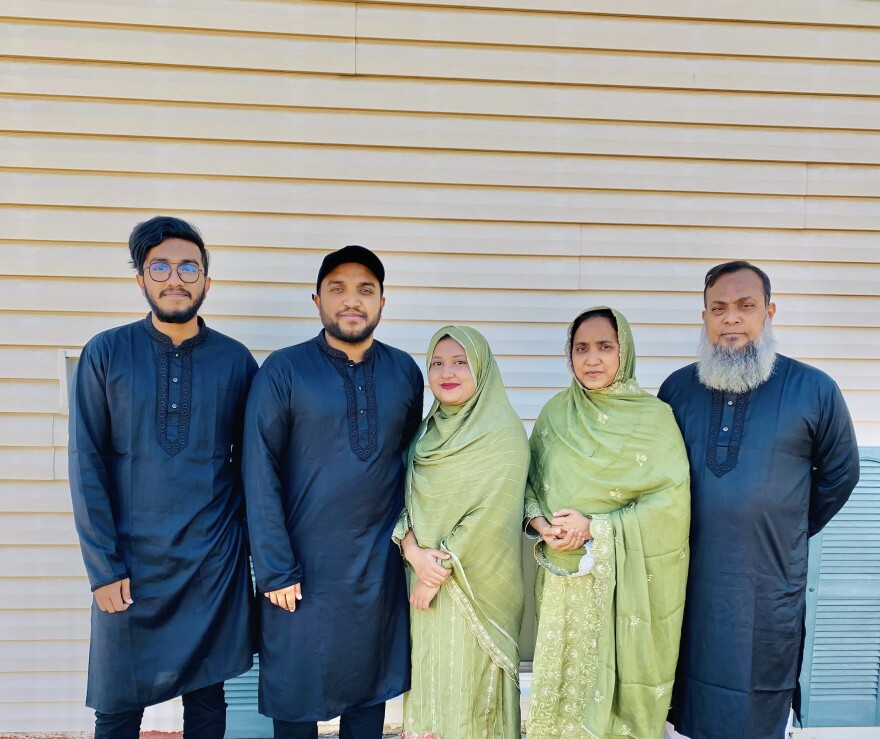As more people across the U.S. are getting vaccinated for COVID-19, talks of 'returning to normal' are growing. This can look like attending concerts with friends to gatherings with family for holidays and traditional events. But this depiction of normalcy isn't the same for everybody.
Mohammed Ahsanul is a Ph.D. student at the University of Wyoming, and was willing to risk everything to create their 'normal'. This meant getting his family from Bangladesh to visit him in the U.S. under a pandemic, navigating health restrictions and the immigration system. Wyoming Public Radio's Naina Rao reports how they made it under incredibly challenging circumstances.
Transcript
Naina Rao: Usually, Mohammed Ahsanul would be at home, in Dhaka, Bangladesh, celebrating Eid-al-Fitr, or Eid. This holiday marks the end of a month of fasting during Ramadan.
Mohammed Ahsanul: We start with prayer in the morning. Very early in the morning. we go to a place, we gather together, we pray together, and then we embrace together with gratitude.
Rao: Then they'd continue to visit their relatives and friends at their homes, and eat a lot of sweets and delicious, spicy food, while wearing brand new outfits to commemorate the celebration.
Ahsanul: But most importantly, it's about you know, going to different places because it's a vacation. We have at least three days' vacation for Eid, in our country. So, we generally go to our villages. If we are in town, we go to different places to celebrate.
Rao: Mohammed Ahsanul is currently a Ph.D. international student at the University of Wyoming. For him and the millions of other Muslims around the world, Eid is a big deal. But Mohammed says in Wyoming the holiday feels almost invisible.
Ahsanul: Here in the United States, I couldn't really differentiate a normal day with Ramadan, to be honest, because you can clearly understand there is no real practice here.
Rao: Last year, Mohammed's family planned to visit him in the U.S. for the first time, to see him graduate with his Master's degree, which coincided with Ramadan, and get a chance to travel around the nation to see what the American dream looked like.
Ahsanul: But then the pandemic happened, they couldn't really come. So, I thought, this summer would be a good time for them to visit me. Meanwhile, if they can celebrate the Eid, that's even better.
Rao: Mohammed and his family hoped that by this time in 2021, things would look better and rescheduled their trip to May of this year. And in a way, it is. With the growing availability of vaccines, it seems like a chance at returning to normal is possible. Yet, that's not the case for him.
Ahsanul: So, my dad got his first dose of COVID-19 vaccine on March 5. And then they said he could actually take the second dose on April 25. So that's why I bought a scheduled ticket on the 28.
Rao: Mohammed's dad didn't end up getting his second dose until May 2. So his family had to reschedule their flight again. And they got out right before Bangladesh instituted another lockdown.
Ahsanul: This time, once again, I had reserved a ticket for them. And it was almost canceled again.
Rao: A few days later, I called Mohammed to ask if his parents had left Dhaka yet.
Ahsanul: They have already arrived in Dubai. And now they have boarded the flight to New York. So, they will arrive in New York, I guess at 6:40 a.m. in the morning. And then at Denver at 4:40.
Rao: It was bright and sunny the next day, when I met Mohammed to head down to Denver.
Rao: [To Ahsanul] Are you excited?
Ahsanu: Really excited.
Rao: As we arrive at the airport, Mohammed's brother calls. His brother tells Mohammed they've landed and gives him the baggage carousel number.
Mohammed fidgets in his seat and keeps looking at his phone nervously. He won't believe that they're here until he sees them.
After parking, we rush to baggage claim. Mohammed walks out in front, eager to find his family. As he spots his brother first, a smile engulfs his face and they reunite in a hug.
While distracted by his brother's hug, his mom slowly approached the two of them. That's when Mohammed pulls away from his brother, and embraces his mom for a long time. She has tears in her eyes. Everybody is a bit speechless, overwhelmed with emotion. And probably jet lagged.
Rao: [To Ahsanul] Do you feel relieved?
Ahsanul: Yeah. As I said I couldn't sleep even for a second. So, it's not really because they're coming. Since this is a risky journey, if something happens to the plane, they're gone. That's the thing going on at the back of my mind. More than excitement, it was the fear of not seeing them again.
Rao: But he doesn't have to worry about that anymore as his family gets in the car, to drive back to Laramie. For Wyoming Public Radio, I'm Naina Rao.
Resources









